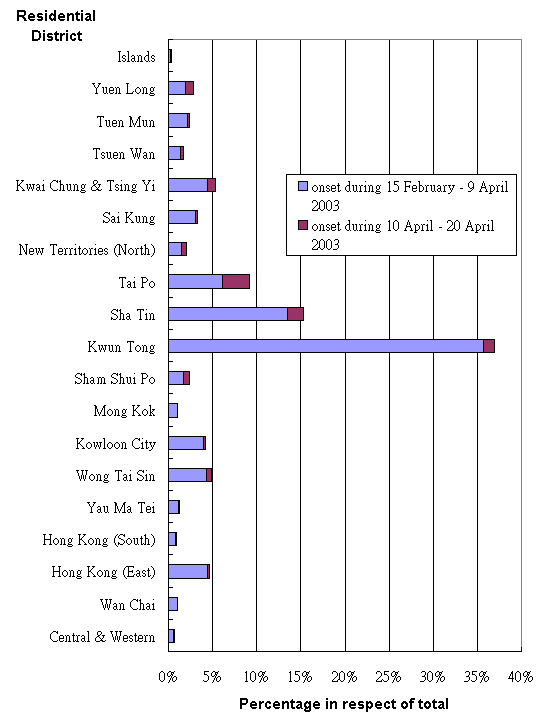|
SARS Bulletin (25 April 2003)
As at 24 April, a total of 1,488 patients have been admitted to public hospitals with the Severe Acute Respiratory Syndrome (SARS), in which 338 are health care workers or medical students. 2. A total of 567 of these SARS patients have recovered and been discharged from public hospitals (45 more than the day before). There are currently 812 SARS patients remaining in hospitals, in which 135 patients are undergoing convalescence before discharge and 108 patients are receiving treatment in the intensive care units. Most of the patients are showing positive responses to the new treatment protocol. There are a total of 109 fatal cases. 3. The distribution of patients by age group and gender is shown in the table below:
4. Based on the information available, the distribution of onset date and residential district of about 1,330 patients is shown in the chart below. It can be seen that the onset date for most of the SARS cases in Hong Kong was before 9 April 1 : 
Hong Kong - Shenzhen Co-operation 5. On 24 April, a meeting between the delegations of the Municipal People's Government of Shenzhen and the Government of Hong Kong Special Administrative Region was held in Shenzhen to exchange experience in implementing port health measures at the border control points. The two sides agreed to enhance co-operation in a bid to control the spread of SARS more effectively and reached consensus in the following areas:
Home Confinement 6. Home confinement for household contacts of confirmed SARS patients began on 10 April. All household contacts of confirmed SARS patients are required to undergo home confinement for monitoring and treatment up to a maximum of 10 days. As at 24 April, a total of 815 persons (from 312 households) had been affected by this requirement, of whom 205 persons (from 78 households) were still under home confinement. Implementation of the home confinement arrangement has been smooth. So far, only 2 cases were referred to the Police for tracing of defaulters. 7. From 25 April, the Government has extended the confinement to household contacts of suspected SARS patients. Ongoing hospital data indicate that of all patients admitted for observation, about 10-20% have clinical features suggestive of the SARS. Putting their household members under home confinement from an early stage would further help to contain the infection by preventing person-to-person transmission. 8. During the home confinement period, health teams from the Department of Health (DH) will visit the persons affected to conduct medical checks. There will also be compliance checks by the Police. If the affected persons need assistance to meet their daily needs, they can approach the Social Welfare Department and the Home Affairs Department. As at 24 April, the Government has provided assistance (e.g., provision of daily necessities and financial assistance) to 545 of these affected persons (from 154 households). 9. The Government will also place on DH's website the names of buildings where the suspected patients reside. Efforts will be made by the Government to ensure housing management of the concerned buildings will step up cleansing and disinfection for the building in question. Measure Body Temperature of Passengers 10. As part of the Government's strategies to contain the spread of SARS, all passengers arriving or departing at the Hong Kong International Airport are required to have their body temperature taken. As at 24 April, no one among the 91,108 persons who had undergone this test was suspected to have SARS. 11. DH has also started measuring the body temperature of inbound passengers arriving in Hong Kong via Hung Hom and Lo Wu with effect from 0600 hrs of 24 April. On that day, a total of 83,900 passengers were checked at the two land borders. None of them was suspected to have SARS.
Prevention of Respiratory Tract Infections in Schools and Pre-school Institutions 12. Child Care Centres / Kindergartens / Schools are advised to refer to the "Guidelines on Prevention of Communicable Diseases in Child Care Centres / Kindergartens / Schools" published by DH in 2000 for general information on the prevention of communicable diseases in school and institutional settings. This is downloadable from the Internet (http://www.info.gov.hk/dh/diseases/guide-e.htm). Specific advice in the school and institutional settings that helps to prevent respiratory tract infections includes :
Further Information 13. To empower the public in fighting against the SARS, DH has also issued advices and guidelines on prevention of the disease for various sectors. Health education information is available on the 24-hour pre-recorded hotlines (2833 0111) and has been uploaded onto DH's homepage (http://www.info.gov.hk/dh). A hotline (187 2222) has also been provided for public enquiries.
1 Meanwhile, the high percentage in Kwun Tong District was mainly due to the cases in Amoy Gardens |